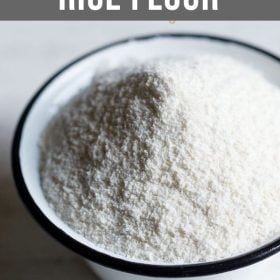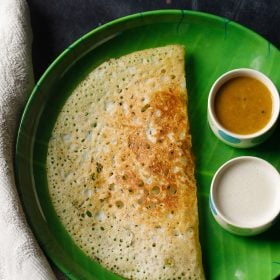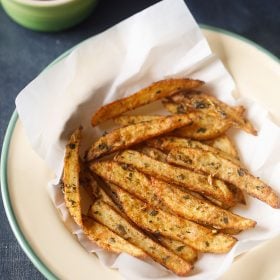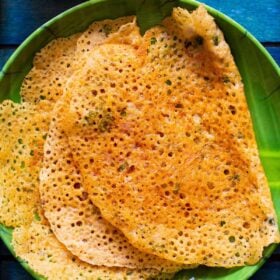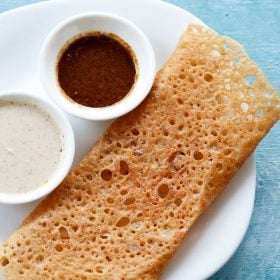Speaking of gluten free flours, my personal favorite is the rice flour. It is neutral, tastes delicate and also acts as an excellent ingredient to crumb coat patties, cutlets and other fried dishes. The Indian cuisine itself has a varied range of Rice Flour Recipes ranging from lovely steamed dishes and pancakes to bakes and more. If you are searching for How To Make Rice Flour, this post is going to be your best guide. Here, I’ve explained a DIY process of making this flour, which will be helpful to you.
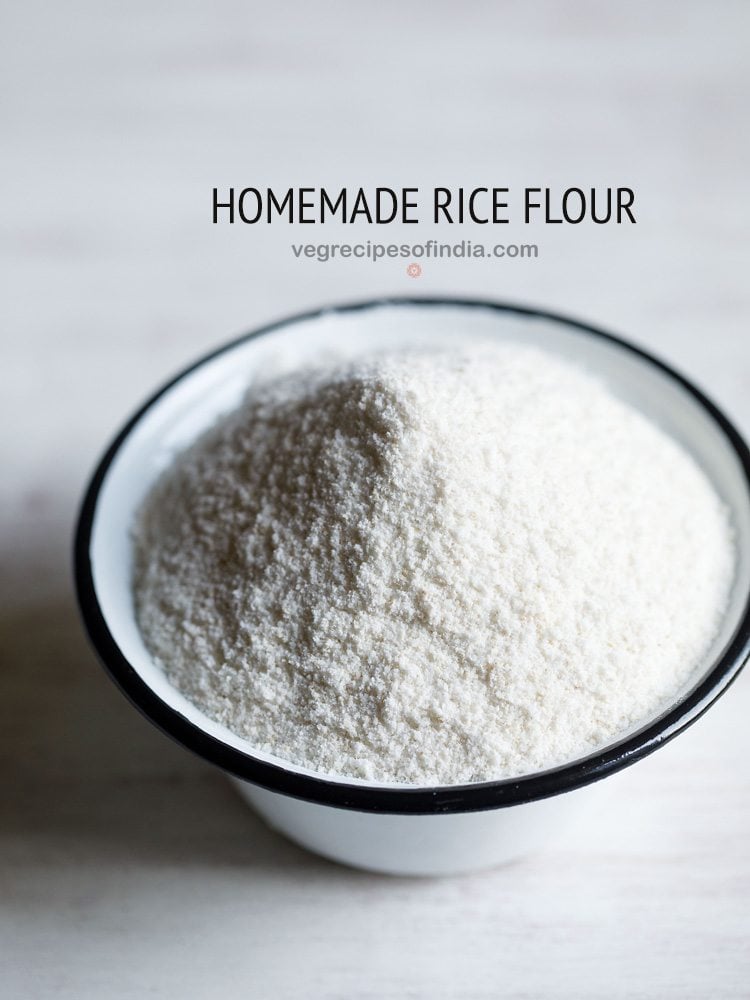
About Rice Flour
Rice Flour is simply rice grains that have been ground to a floury texture. Before you check out this pictorial representation of How To Make Rice Flour, followed by some of my top picks of Rice Flour Recipes, read on a little know-how about this flour.
As much as it is a key choice in gluten free cooking and baking, rice flour is also a great choice when it comes to imparting a crunchy, crispy texture in fried preparations.
If you thought that we Indians are the only people using this flour extensively, then you’re mistaken. It is also popularly used in countries like Korea, Vietnam, Japan, China, Turkey, Burma, Sri Lanka etc.
As far as the varieties are concerned, primarily there are 3 types of rice flour: White, Brown and Sweet or Glutinous. We mostly use the white variety in many of our recipes, sometimes brown too for healthier options.
However, short grain glutinous rice is used to prepare the sweet one, making it starchy too. Hence, it is also not the right alternative to the everyday white flour made from white rice.
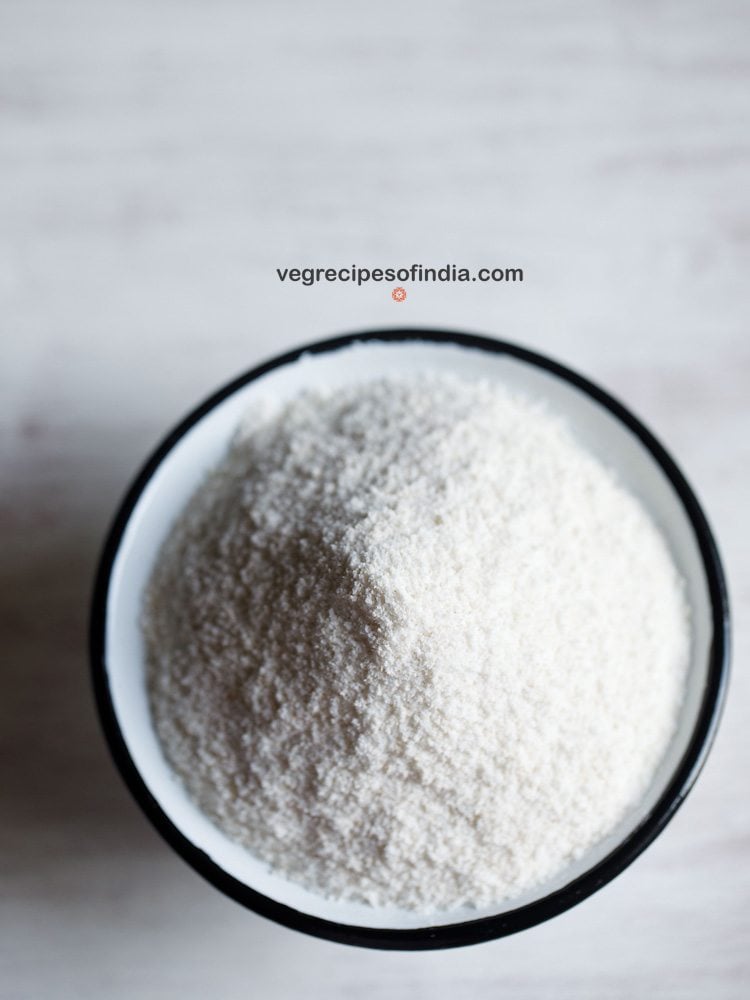
More On The Homemade Method
India is a land of festivals. And it is hard to imagine our festivals too without food. Since there are a lot of rules that we follow especially when it comes to food for religious fasting or festivals, rice flour is one of the main ingredients that is used to make such food.
Out of an ocean of Rice Flour Recipes, some of my top picks which may have this particular flour in combination with other flours, are South Indian Snacks of Rava Dosa, Oats Dosa, Akki Roti, Murukku.
How I can forget the sweet rice flour dumplings that we call Modak and offer it to Bhagwan Ganesh during the Ganesh Chaturthi Festival.
So, when you are finding answers on How To Make Rice Flour especially when you are offering any food to deities, it is best to refer to this post of mine and make it at home instead of buying it from a store.
I have made this flour at home on many occasions. One of the earliest memories is making a murukku with it on Diwali.
I had learnt from one of my readers that a special type or rice called IR 20 is used in South Indian snacks. This typical rice is easily available in Tamil Nadu, but not in other parts of the country.
Even I didn’t have it. So, I used the sona masuri rice to make this flour. If you get the IR 20 raw rice, use it. Or else you can even use any other short to medium grain rice.
You can use any quantity of rice. Use a mixer-grinder to grind a small quantity. Opt for a grinding mill (chakki) if there’s large quantity. After making the flour, store in an airtight jar. You can even refrigerate or freeze it.
Rice Flour Uses
As mentioned in the earlier section, different varieties of this specific flour are used in different cuisines. Here’s some more scoop on these uses of those:
- The white flour made from bran-less white rice and brown flour made from whole grain, predominantly are tasteless and have a nutty taste, respectively. Thus, are good for making cakes, pastries, noodles and as thickening agents in stews, soups, etc. These two can usually be interchanged amongst themselves in recipes.
- The sweet flour, also known as sticky rice or glutinous rice flour is made from glutinous rice grains that are first cooked, then dehydrated and ground to a flour. This type has a typical property of developing a sticky and chewy texture, when cooked in dishes. Thus, popularly used in Japanese and other South East Asian cuisines.
Step-by-Step Guide
How To Make Rice Flour
Soak and Dry Rice
1. Take the required quantity of rice you need. Rinse in water a couple of times and then soak for 2 to 3 hours in enough water. I used 1.5 cups of sona masuri rice.
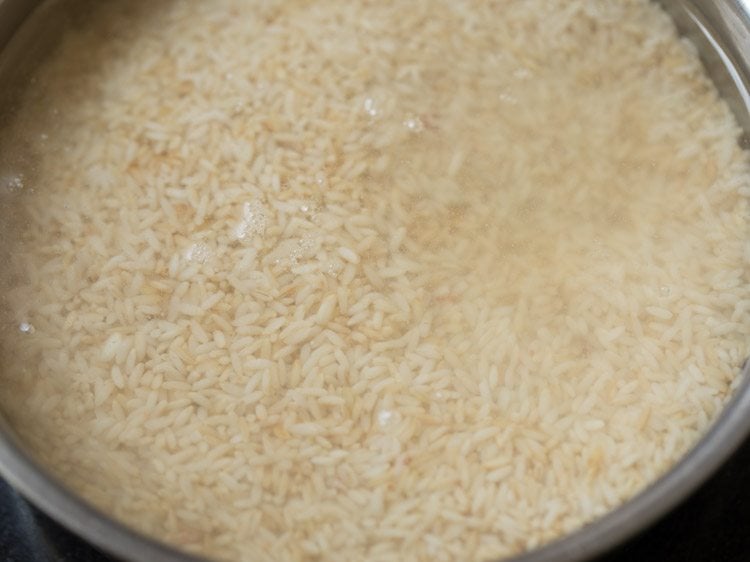
2. After 2 to 3 hours, drain all the water. Soaking for more time helps the rice grains to grind well.
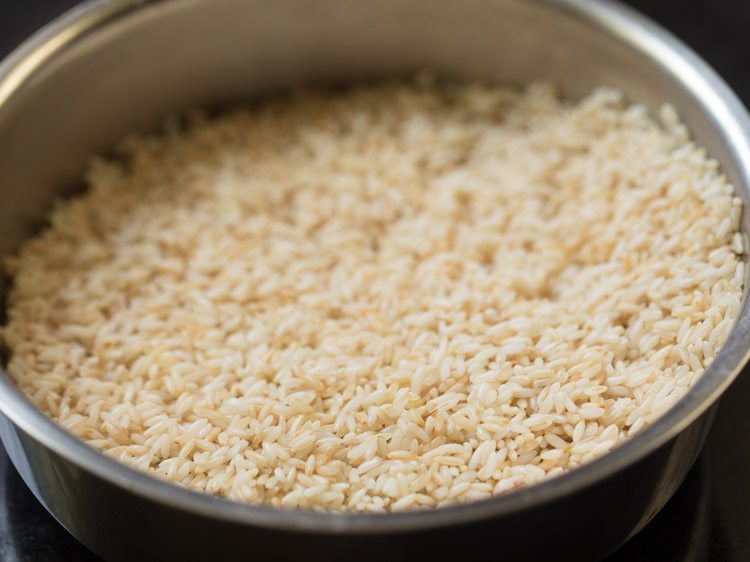
3. Now, place a large clean kitchen napkin or kitchen towel on the countertop or on a table. Spread the rice on the kitchen towel.
Let the rice grains dry in shade or under the fan for about 45 minutes to 1 hour. Do not dry in the sun.
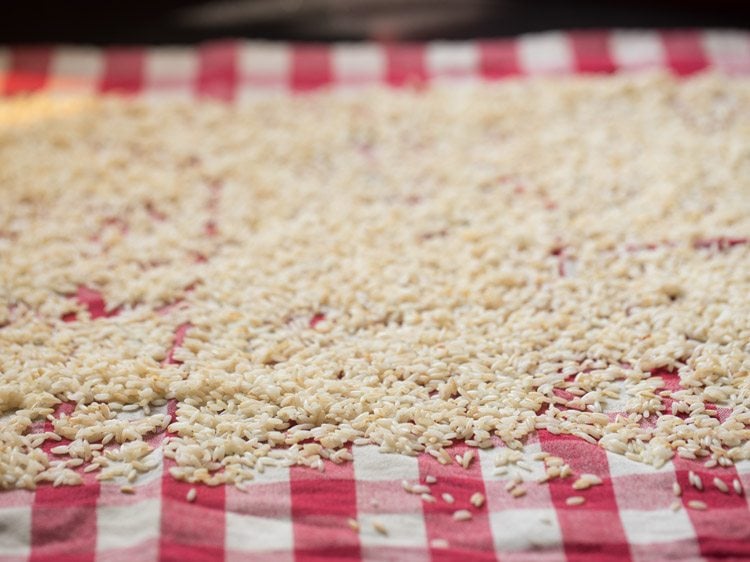
4. Let the rice grains dry completely or depending on the recipe where they will be used, they can have a faint moist touch to them.
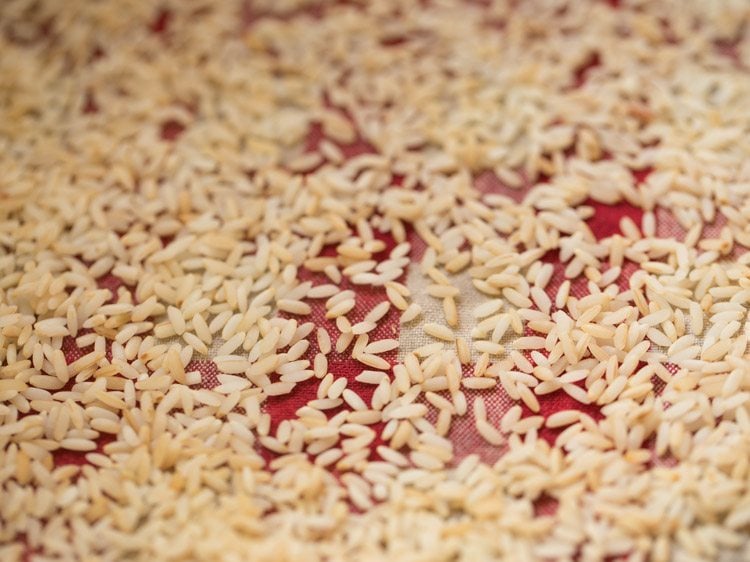
Make Rice Flour
5. Later add the rice grains in a mixer-grinder or a sturdy blender.
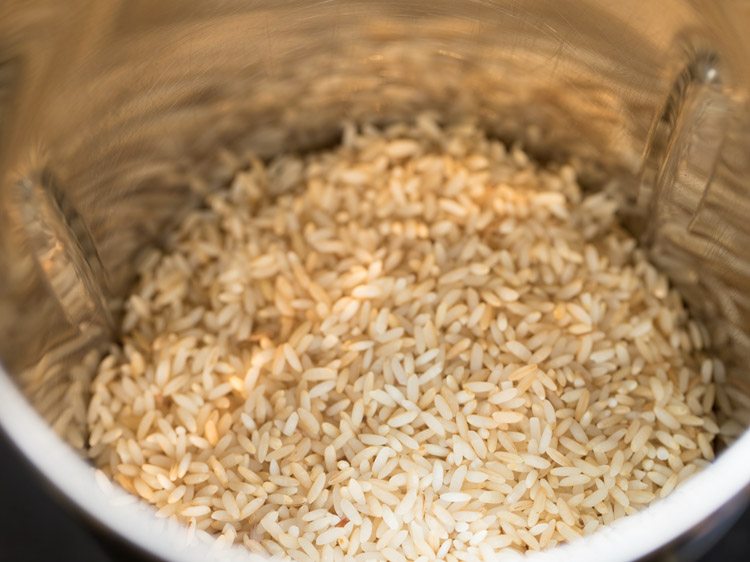
6. Grind to a fine texture or the texture that you need for the recipe you will use it for. This means you can grind to a fine floury texture or a semi-fine or coarse texture according to your needs.
I ground rice grains in one batch. But if you use more cups of rice, then you will have to grind in 2 to 3 batches.
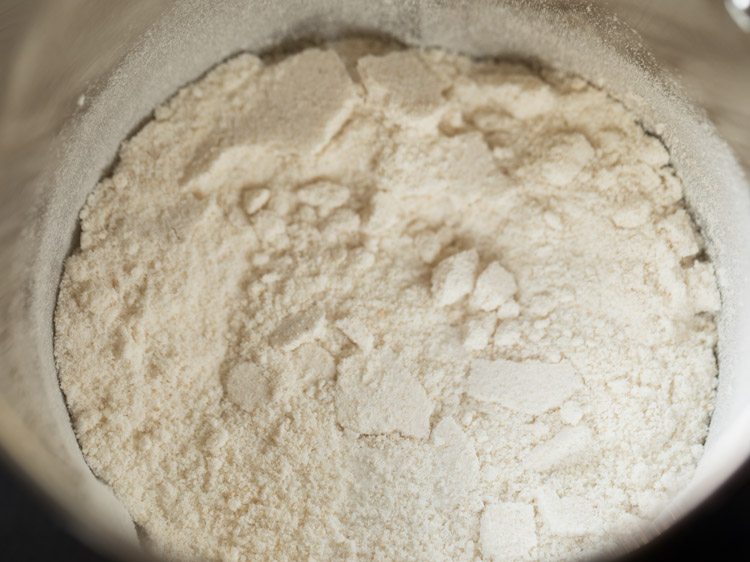
7. Take the ground flour in a sieve and sift it.
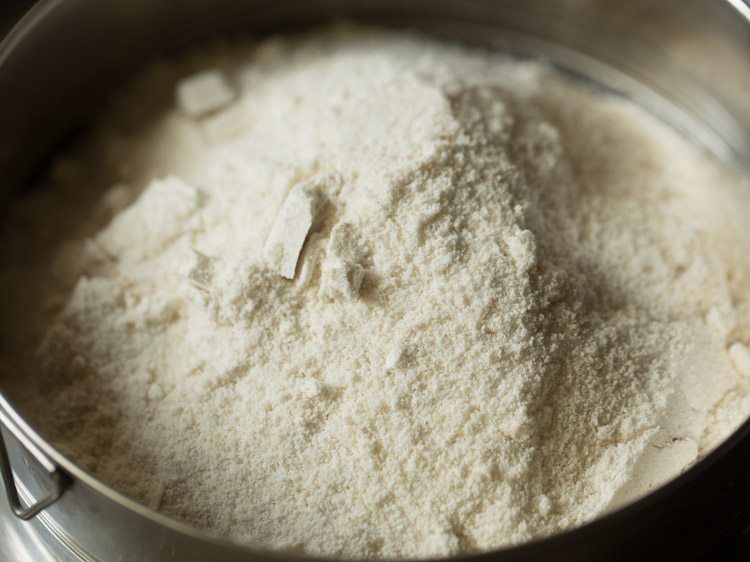
8. Below is a picture of the sifted flour.
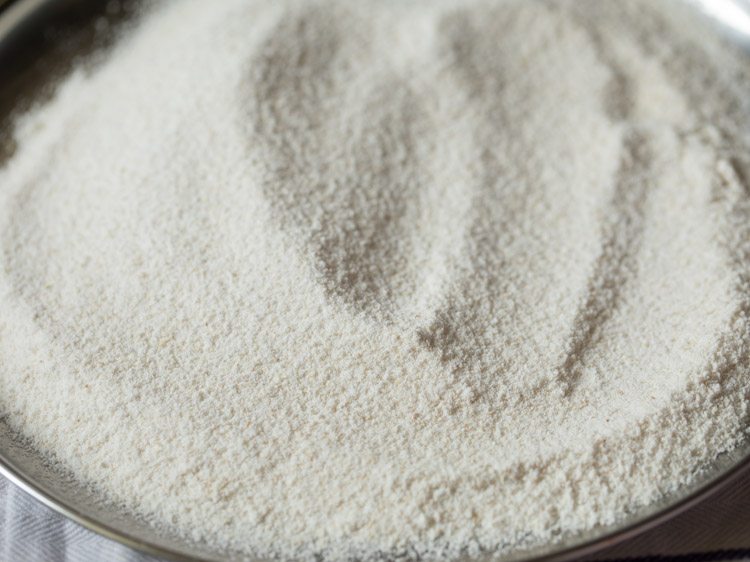
9. After sifting, you will see small granules of the rice grains in the sieve. You can add these back to the grinder jar, grind and sift again.
Or you can use this small idli rava like rice grains to make idli, dosa, upma or any recipe that calls for rice rava.
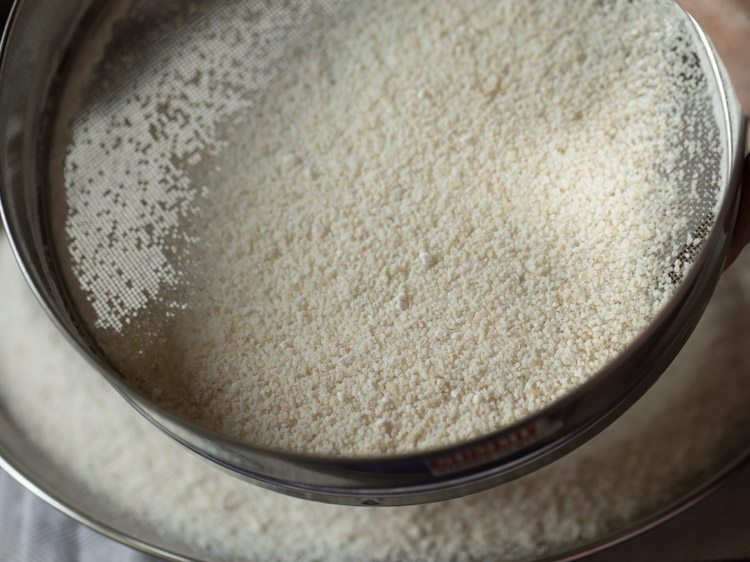
10. Now, spread the flour on a plate and keep it for sometime till its completely dry.
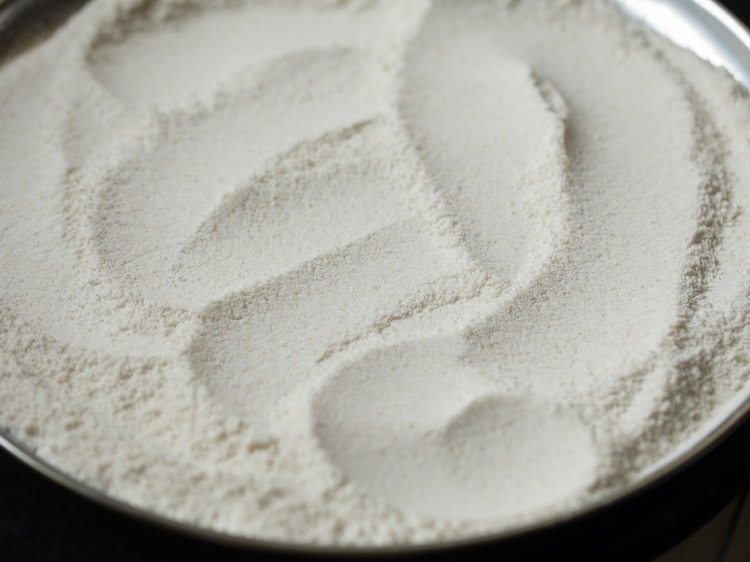
11. Then, spoon the flour in an air tight container. Store in a cool place and use as required.
If the recipe calls for roasting the flour, you can roast till you see some steam coming from it.
If not using in a few days, refrigerate or freeze rice flour. 1.5 cups of rice yields about 2.33 cups of rice flour.
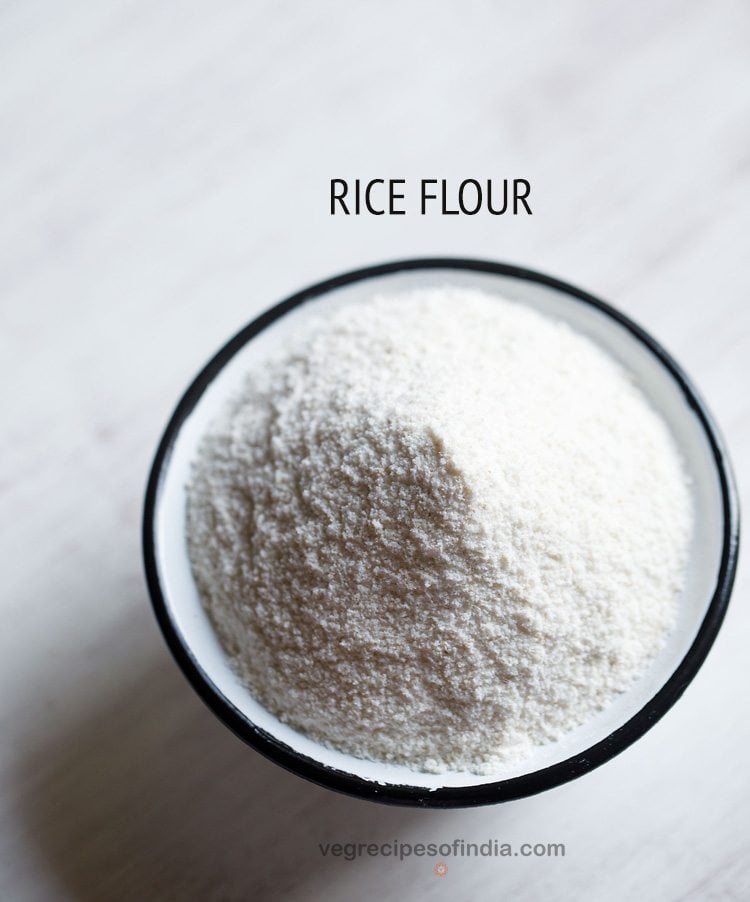
Rice Flour Benefits
Since today we are living in a world of gluten free foodstuffs, which have become the usual norm for many people, this specific ingredient is a great option especially when it comes to flour options. You can make your regular dishes as well as bake with it, there’s not really an end when it comes to recipes made with this flour. It is versatile that way.
In addition to being a gluten free friendly choice, it has many other benefits for the health. Some of these are:
- Brown rice flour is a rich source of fiber; thus, helps in lowering cholesterol levels as well as keeps a check on your blood sugar levels and bowel movements as well. Also, reducing the risk of hypertension, diabetes, etc.
- Flour made from brown rice is also a good source of calcium and other minerals; thus, making it a perfect food choice to strengthen skeletal and bone health. It is also believed to have anti-inflammatory properties; thus, boosting hair and skin health.
- Rice flour is known to have beneficial effects on the functioning of the liver; thus, enhancing your liver health.
- Since it is a gluten-free flour, it is also great for consumption by people who are suffering from celiac diseases.
Expert Tips
- To make rice flour, you can use either white rice or brown rice depending on what you prefer. Use any non-sticky variety of short grained or medium-grained rice.
- To grind the rice grains well, soak for more time, drain completely, dry the grains well and then use.
- To dry rice grains, spread on a large clean kitchen napkin/towel and put it in shade or under the fan for about 45 minutes to 1 hour. Don’t keep in sunlight. The rice grains can be completely dry or have a faint moist touch to them, depending on the recipe you will be making with it.
- Once you are done with sifting the flour, you will see small granules of rice in the sieve. You can grind these once more and sift again. Or use it to make idli, dosa, upma or any other dishes that calls for rice rava.
- This flour has to be kept in a cool place packed in an airtight container. If not using immediately or within few days, refrigerate or freeze it.
FAQs
Yes, it is possible to use rice flour in place of all-purpose flour, but only partly. It is not possible to use rice flour instead of all-purpose flour completely. This will also depend from recipe to recipe.
It is certainly a healthier choice since it is gluten-free, high in fiber and some other minerals.
You can use rice flour in a variety of dishes like baked good like cakes, cooked and others like crepes, pancakes, rice cakes and similar dishes in South East Asian cuisines.
In India, rice flour is used to make a variety of snacks and is also used to impart more crispiness in fried dishes.
Rice Flour Recipes To Try!
Breakfast Recipes
Snacks Recipes
Breakfast Recipes
Breakfast Recipes
Please be sure to rate this recipe in the recipe card below if you have made it. For more vegetarian inspirations, Sign Up for my emails or follow me on Instagram, Youtube, Facebook, Pinterest or Twitter.
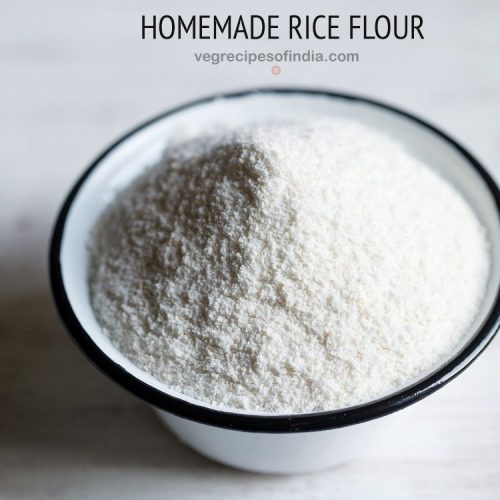
How To Make Rice Flour | Rice Flour Recipe
Prepare rice flour at home any time you need it to make various snacks or sweets. Making homemade rice flour is not difficult and all you need is a good mixer-grinder or blender or a grain mill to grind the rice grains.
Prep Time 2 hrs 20 mins
Cook Time 0 mins
Total Time 2 hrs 20 mins
Prevent your screen from going dark while making the recipe
Soaking rice
Take the required quantity of rice you will need. Rinse in water a couple of times.
Soak rice for 2 to 3 hours in enough water.
After 2 to 3 hours, drain all the water from the soaked rice grains.
Drying rice
Now place a large clean kitchen napkin or kitchen towel on the countertop or on a table.
Spread the rice on the kitchen towel. Let the rice grains dry in shade for about about 45 minutes to 1 hour. Do not dry in the sun.
Depending on the type of snacks you are making, you can completely dry the rice grains or let them have a faint moist touch.
Making rice flour
Then add the rice grains in a mixer-grinder jar or a sturdy blender. For larger quantities of rice, use a grain mill.
- Grind to a texture you prefer – it can be fine, semi-fine or coarse. The texture of the rice flour will depend on the recipe you will be using.I ground rice grains in one batch. But if you use more cups of rice, then you will have to grind in 2 to 3 batches and for more quantities, grind in a mill.
Take the rice flour in a fine sieve and then sift it.
- After sieving you will see small granules of rice grains in the sieve. You can add these back to the grinder jar and then grind again and sift again. Or you can use these small idli rava like rice grains to make idli or dosa or any recipe that calls for rice rava.
Now spread the rice flour in the plate and let it dry for some more time till its completely dry.
Then spoon the rice flour in an air-tight container. Store in a cool place and use as required.
- If the recipe calls for roasting the rice flour, then you can roast till you see some steam coming from it. If not using in a few days, then you can refrigerate or freeze rice flour. From 1.5 cups of rice, I got 2.33 cups rice flour.
- Use any variety of non-sticky medium to short grained rice to make the flour.
- Note that the approximate nutrition info is for 1 tablespoon of homemade rice flour.
Nutrition Facts
How To Make Rice Flour | Rice Flour Recipe
Amount Per Serving
Calories 36 Calories from Fat 9
% Daily Value*
Fat 1g2%
Saturated Fat 1g6%
Sodium 1mg0%
Potassium 11mg0%
Carbohydrates 8g3%
Fiber 1g4%
Sugar 1g1%
Protein 1g2%
Vitamin B1 (Thiamine) 1mg67%
Vitamin B2 (Riboflavin) 1mg59%
Vitamin B3 (Niacin) 1mg5%
Vitamin B6 1mg50%
Vitamin E 1mg7%
Calcium 3mg0%
Vitamin B9 (Folate) 1µg0%
Iron 1mg6%
Magnesium 2mg1%
Phosphorus 11mg1%
Zinc 1mg7%
* Percent Daily Values are based on a 2000 calorie diet.
This Rice Flour recipe post from the blog archives first published in October 2017 has been republished and updated on 27 August 2022.
Source link


